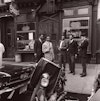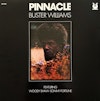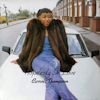I am sitting in front of my TV with the sound off, watching the George Floyd murder trial. I can’t take much more. No newscaster’s commentary can help quell this catastrophe of injustice. There are no words for the grief and misery his family, friends, and neighbors are enduring. The only thing that makes sense at this moment is reaching for Albert Ayler’s powerful music, to wash away all the suffering… “A hard rain,” as Bob Dylan once sang, to cleanse the soul.
Whether howling with joy, or wailing with despair, Ayler’s scope of emotion was astounding. “Truth Is Marching In,” the opening track, rips through my speakers with the collective caterwaul of a derailed New Orleans brass band.
“When there’s chaos, which is now, only a few people can listen to the music that tells of what will be,” Ayler said. “You see, everyone is screaming, ‘Freedom now!’ but mentally, most are under a great strain. But now the truth is marching in, as it once marched back in New Orleans, and that truth is there must be peace and joy on Earth.”
Albert Ayler, like his mentor John Coltrane, envisioned himself “a true messenger,” not just of jazz, but of the Holy Spirit. Ayler’s passionate saxophone possessed a deep melancholy, as if judgment day was nigh and his soul would soon be reunited with God.
“Bells” and “Ghosts” ebb and flow over majestic waves of rumbling drums and crashing cymbals, while the sixteen-minute “Initiation” seems more a talisman of a sonic ritual than a jazz recording. “Our Prayer,” as Donald Ayler explained, was “about the spiritual principles of the universe.” Donald’s fierce trumpet playing was his way of seeking “another level of peace.”
Backing the Ayler brothers were violinist Michel Sampson, bassist Lewis Worrell, and a young Ronald Shannon Jackson on drums. Playing with Albert “was a once in a lifetime experience, almost impossible to convey,” Jackson told me. “John Coltrane loved Albert’s playing,” he said, recalling “riding in the backseat of Trane’s station wagon, listening to two creative forces discussing the philosophical, physical, and spiritual demands” that their music required.
Bassist Henry Grimes (who also recorded with Ayler) once told me, Albert’s music was “strong and fantastic, very demanding and abstract…[yet] with roots in the church.”
But Slug’s Saloon, which opened in 1964 on New York’s Lower East Side, was no church! The word “saloon” conjures images of the Old West—hard-drinking and gunfights. And nobody knew that better than trumpeter Lee Morgan, famous for his classic Blue Note album The Sidewinder, who was shot dead outside the club by his common-law wife Helen in February, 1972. And you can feel that ever-present edge in this recording.
Albert Ayler was always quick to remind us we must constantly rise above and take the high road: “We’re not screaming against the system. A man who’s creating doesn’t have time to hate.”


